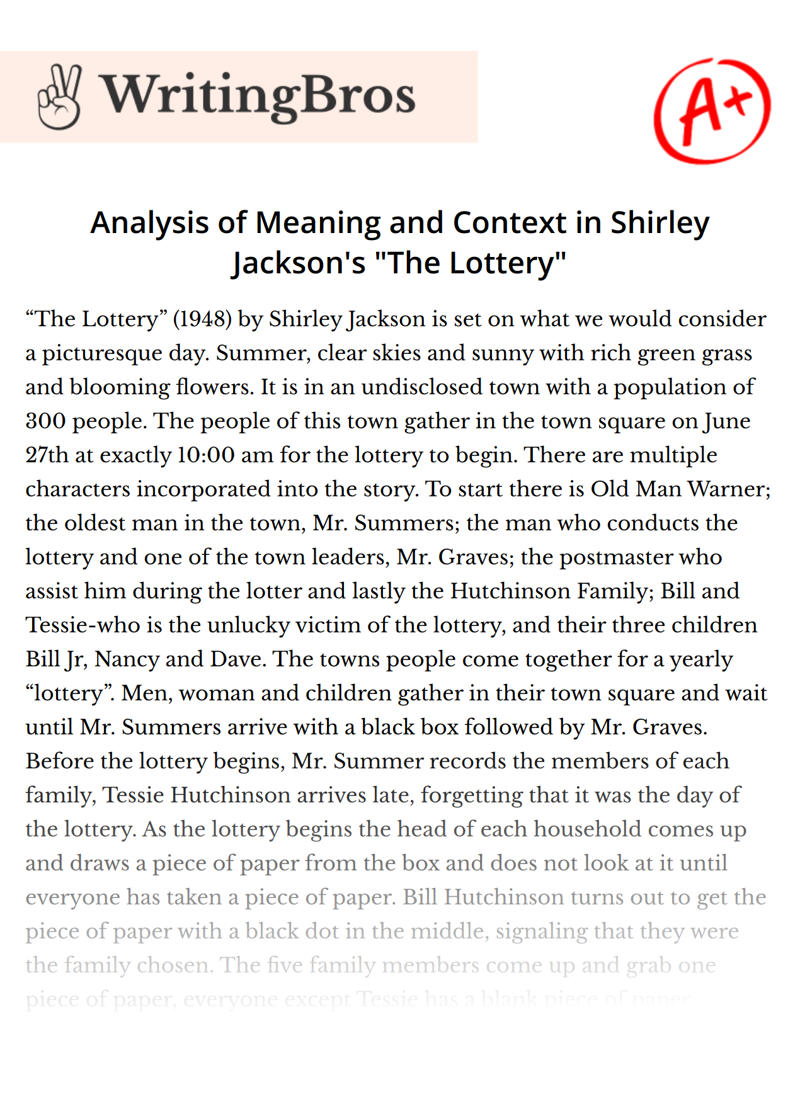Analysis of Meaning and Context in Shirley Jackson's "The Lottery"

“The Lottery” (1948) by Shirley Jackson is set on what we would consider a picturesque day. Summer, clear skies and sunny with rich green grass and blooming flowers. It is in an undisclosed town with a population of 300 people. The people of this town gather in the town square on June 27th at exactly 10:00 am for the lottery to begin. There are multiple characters incorporated into the story. To start there is Old Man Warner; the oldest man in the town, Mr. Summers; the man who conducts the lottery and one of the town leaders, Mr. Graves; the postmaster who assist him during the lotter and lastly the Hutchinson Family; Bill and Tessie-who is the unlucky victim of the lottery, and their three children Bill Jr, Nancy and Dave. The towns people come together for a yearly “lottery”. Men, woman and children gather in their town square and wait until Mr. Summers arrive with a black box followed by Mr. Graves. Before the lottery begins, Mr. Summer records the members of each family, Tessie Hutchinson arrives late, forgetting that it was the day of the lottery. As the lottery begins the head of each household comes up and draws a piece of paper from the box and does not look at it until everyone has taken a piece of paper. Bill Hutchinson turns out to get the piece of paper with a black dot in the middle, signaling that they were the family chosen. The five family members come up and grab one piece of paper, everyone except Tessie has a blank piece of paper therefore crowning her as the lottery’s “winner”. Mr. Summer’s instructs the townspeople to finish quickly and the children and other families grab stones to stone Tessie to death.
The ultimate meaning of this story is people are adherent to follow a tradition just for the sake of it. The lottery has been around in this story for quite some time. As quoted “the original paraphernalia has long been lost” and the black box that had been recently used has been around since before Old Man Warner was born; so more than 77 years old. These villagers have been practicing this barbaric ritual for over 7 decades for what? Good crops? Old Man Warner quoted “Lottery in June, corn be heavy soon”. I believe that he is a firm believer that murdering people with this ancient “tradition” brings good crops to their town and breaking that tradition will bring a shortfall of food as quoted “we'd all be eating stewed chickweed and acorns” No one in this town has questioned the logical backing on why they are murdering their neighbors and friends each year. These people are hive minded and are born into a certain mindset and therefore follow what their parents and their parents before them have done.
Censorship and 'The Lottery'
Edna Bogert, the author of this interpretation speculates the purpose of the lottery. Is it for population control or for pure entertainment? we’re not very sure. She points out the fact that most of the people in the story don’t seem to enjoy the stoning. The villagers are getting bored with the ritual. This author states that there is no reason for the lottery except for tradition. The village is a traditional community and the men and woman of the village fill traditional roles; woman working in the kitchens and the men in the fields(Bogert,46). “The Lottery” suggests that traditions ought to be re-examined from time to time. Edna and I share the same interpretation of the story especially with the idea that the lottery is withheld duly for the purpose of tradition. I thought it was interesting that she incorporated that 3 years prior of “The Lottery we learned the extent of what Hitler and his followers had done to Europe’s Jews and against that background “The Lottery” was written. (Bogert, 46)
The Stoning of Mistress Hutchinson: Meaning and Context in 'The Lottery'
Fritz Oehlschlaeger incorporates a lot of symbolism in his interpretation. He is interpreting that there is a lot of male dominance in “The Lottery”. Men control the lottery, while females have resistance. The society is a heavily patriarchal (Oehlschlaeger, 3) As the people gather at the town square in the beginning of the story, the women stand “by their husbands,” and Jackson distinguishes female from male authority. For example- when Mrs. Hutchinson complains that the draw has been unfair, her husband commands her, “Shut up, Tessie.” Mr. Summers, and his wife further clarify the nature of male power and female submission in the lottery's community. Mr. Summers is given his position because people feel “sorry for him” because he has no children and his “wife was a scold (Oehlschlaeger, 3). Which is a challenge to male authority. The author also incorporates religion into “the Lottery”. He states that woman being stoned to death recalls chapter 8 of St. John where Jesus frees the woman taken in adultery “let him who is without sin cast the first stone” (Oehlschlaeger, 4). My second interpretation is much different due to this author’s context in religion and male dominance in “The Lottery” vs mine which mainly focused on following tradition.
Cite this Essay
To export a reference to this article please select a referencing style below

